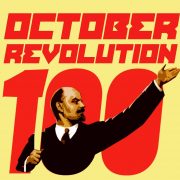Intervention of CARC Party – Italy on the question of making revolution in imperialist countries
The Partito dei Comitati di Appoggio alla Resistenza – per il Comunismo (CARC Party, Italy) participated in the Amsterdam conference on the 100th anniversary of the October Revolution on 23-24 September 2017. The following is the full text of the CARC Party’s intervention, which was presented by Comrade Paolo Babini. (Subheads and footnote is by PRISM editors.)
Intervention by Partito dei Comitati di Appoggio alla Resistenza – per il Comunismo (CARC Party, Italy), Settore Relazioni Internazionali, presented by Paolo Babini, CARC Party
on Topic 1 of the study conference on the 100th anniversary of the October Revolution
Amsterdam, The Netherlands
23 September 2017
Dear comrades,
We greet you all and thank the comrades who organized this Conference. They are giving us the possibility to celebrate the October Revolution Centennial with many comrades of the International Communist Movement, and particularly with communists of the imperialist countries. We are, in fact, interested in developing a debate particularly with them. It is the debate about the task of making revolution in an imperialist country, a task yet not achieved in the International Communist Movement.
Make revolution, build on the heritage of the October Revolution
To make the revolution in its country is the best way for the communists of the imperialist countries and for their parties to build on the heritage of October Revolution, and to go onwards on the way that Lenin and Stalin started and paved. It is indeed the best way to celebrate October Revolution Centennial. Stalin put it in the best way with the words that I quote:
What is needed to enable the proletarians of the West to win? First of all, confidence in their own strength, the consciousness that the working class can do without the bourgeoisie, that the working class is capable not only of destroying the old, but also of building the new, of building socialism. The entire work of Social-Democracy consists in imbuing the workers with scepticism, with distrust in their own strength, with disbelief in the possibility of achieving victory over the bourgeoisie by force. The significance of all our work, of all our construction, lies in that this work and this construction convince the working class in the capitalist countries that it can do without the bourgeoisie and can build the new society by its own efforts.
(…)
And when the workers in the capitalist countries become imbued with confidence in their own strength, you may be sure that this will be the beginning of the end of capitalism and a sure sign of the victory of the proletarian revolution. (Political Report of the Central Committee, 18 December 1925)1
According to Stalin, therefore, the socialist revolution in the imperialist countries was possible, necessary and directly connected with the work for building socialism in the Soviet Union. Lenin thought the same. The CARC Party and the (new) Italian Communist Party agree with them, and they think, therefore, that making the socialist revolution in an imperialist country was possible then and that it is possible now. Therefore today they work for making Italy a new socialist country.
Class struggle and two-line struggles continue within socialist countries
We are here to talk about the factors that gave rise to revisionism. Do you agree with Lenin and Stalin, that making the socialist revolution in some imperialist country was possible? If you do so, you will also agree that not having made it weakened the work for building socialism. This weakened the left wing in the parties leading the first socialist countries and strengthened their right wing, the ones who were going to be the revisionist leaders. In fact, this is the main external factor of the deviation in the first socialist countries, together with the slaughter of the flower of the communists among the 20 million people killed in the four years of the Nazi aggression.
The main internal factor was that the leftists did not understand that the class struggle in the socialist countries continues: the new bourgeoisie forms among the leaders of the communist party, of the State, of the economy, of the other social institutions. Therefore, in those parties there were two lines and two wings, the left and the right ones. The left wing included those who were looking to open the new road and to build the new social order. The right wing included those who promoted the old solutions for the new challenges that the edification of socialism was raising, the capitalist solutions. Without a doubt, the left wing carried out a relentless struggle against the rightists. Stalin did it against Trotsky, Bukharin, Zinoviev and others. Anyway, the leftists did not have an advanced and dialectical materialistic understanding of the class struggle in the socialist society nor of the two-lines struggle in the party. They often acted blindly, and with a metaphysical mentality, and they were not able to prevent the rightists to prevail in the 20th Congress of CPSU, in 1956.
They therefore were not able to develop the communist conception of the world, the science of the activities by which human beings make their history, the theory that was the foundation of the road to victory in Russia from 1903 to 1917 by the Party of Lenin and his comrades. That theory was the development of Marxism, and due to Lenin’s contribution, had been called Marxism-Leninism. Led by this theory, the communist movement expanded and spread globally and tremendously. Anyway, it neither served to prevent the revisionists to prevail, nor to make the socialist revolution in any imperialist country, despite the heroism and the sacrifices of so many people. What lacked was the development of the science, not the commitment, the will, the passion, the heroism.
CARC Party therefore shares what the (new) Italian Communist Party says, that we must develop the science for winning, for defeating the imperialist bourgeoisie and the revisionists, who are its spokespersons within the working class and within its communist party.
Mao Zedong developed the science that was Marxism-Leninism, which then became Marxism-Leninism-Maoism. Maoism gave many important contributions to advance the communist thought. Two of them were those we talked about above: one is that in the socialist countries the bourgeoisie will be found within the party, the State, in economic and other social institutions; the other is that the two-lines struggle has to be carried out as the means to defend the party from the bourgeoisie’s influence and to develop it. We said above that the left wing of the communist movement in the socialist countries did not produce scientific principles about these matters, and that was the reason why they were not able to prevent the revisionists from prevailing. Therefore, Maoism, with its two contributions, enables us to understand the reason of the rise of revisionism.
Need to further develop strategy for proletarian revolution in imperialist countries
The other factor that opens the road to revisionism in the first socialist countries was that there had been no socialist revolution in the imperialist countries. That was a task that only the communist parties of the imperialist countries and their leaders could implement. Maoism gave another contribution that enables the communists of the imperialist countries to make the socialist revolution. The (n)ICP said this in its speech: socialist revolution does not break out, but it is made (it is built), and it is made as a war, a protracted revolutionary people’s war.
Every successful revolution until today followed this strategy, starting from the one promoted in Russia by Lenin’s Party, particularly since 1903 to 1917. Mao Zedong was the first who not only promoted it but also theorized it, along the lines of Engels, who in 1895 drafted the theory about it.
The scientific definition of the protracted revolutionary people’s war by Maoism is consistent with Engels, who in 1895 said that socialist revolution is not a spontaneous insurrection of the popular masses in which the communists take the lead, but is a process that must be carried out by the working class and by its party within the society ruled by the bourgeoisie. Antonio Gramsci, too, was consistent with Engels and with Mao Zedong. He clearly said that socialist revolution must be made as a war (a “war of position”, in his words) and criticized all those communist leaders who were saying that socialist revolution is an insurrection (mainly Trotsky, but also Rosa Luxemburg).
Waiting for the revolution to break out, says Gramsci, is passivity. It is like what people belonging to the oppressed classes did when they believed in Divine Providence and justice, he says. To become revolutionary means to become active, and to build the revolution for socialism, carrying it out with revolutionary theory, a science that only the working class can produce and that the class enemy will never be able to understand. This is Gramsci’s thinking about the strategy of socialist revolution.
Actively creating the conditions for revolution in Italy
As I said above, socialist revolution is possible everywhere, also in the imperialist countries. Every party in an imperialist country can make the revolution in that country. If it does not do so, this means that it is unable to make revolution, and not that it cannot make it. It means that its conception is wrong. If a party is waiting for the revolution to come, for objective conditions to come, if it is waiting for the revolution to come from outside, if it is waiting for the revolution to break out at the same time all over the world, it is wrong.
The objective conditions for the socialist revolution in the imperialist countries existed for more than a century, according to Lenin and Stalin. No revolution can be imported in any imperialist country. An instantaneous world revolution is nonsense: the world revolution can be only a combination of proletarian revolutions in various countries, as each one of them is different and requires different ways and different times. This is another lesson we draw from the October Revolution, that would not have been done if its communist leaders waited for a world revolution.
In Italy the working class and the popular masses are organizing themselves spontaneously. They create workers’ and people’s organizations for facing the worst effects of the crisis, struggling for the rights of workers, of all labourers, women, young people, students, for defending the Constitution, for the environment, for facing the consequences of earthquakes, floods and other disasters that the bourgeois State do nothing to prevent, and so on. These organizations need a government that gives the force of law to what they are doing. It will be an emergency government, imposed by the popular masses on the imperialist bourgeoisie and on the Vatican. There are objective conditions for such a government. The parties and organizations that share the road to socialist revolution paved by the (n)ICP, including the CARC Party, are working to create the conditions for making such revolution possible.
To create such conditions today in Italy is to carry out the socialist revolution. Such a government, in fact, will still be a government led also by bourgeois forces and elements. Anyway, it will allow the working class and its communist party to carry out from a better position the strategy for socialist revolution, to fight the war in more advanced lines toward the completion of socialist revolution, the establishment of the dictatorship of proletariat.
All these topics we are explaining here are new, and it is not possible to synthesize them in one only speech. We are willing to explain them in detail to anyone who wants to discuss them with us. We are also experimenting what we say in the current class struggle in Italy. We wish to be successful, and the sooner as possible, not only for ending the oppression by the imperialist bourgeoisie and the Vatican in our country, but also to contribute to the new rising wave of proletarian revolution and to honor all the communists who have fought in the past century, in Italy and elsewhere.
Long live the October Revolution!
Long live the International Communist Movement!
Let’s make Italy a new socialist country!
1For the above-quoted paragraphs, we used the direct English translation from the 1954 ed., Foreign Languages Publishing House as substitute for the alternate English translation as provided in the CARC paper.




Leave a Reply
Want to join the discussion?Feel free to contribute!